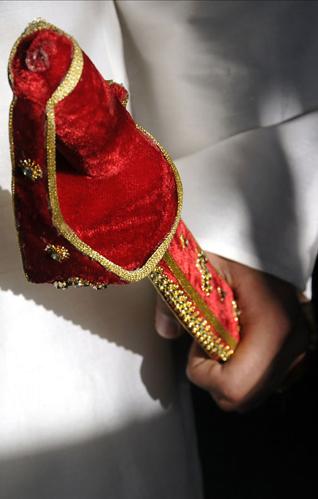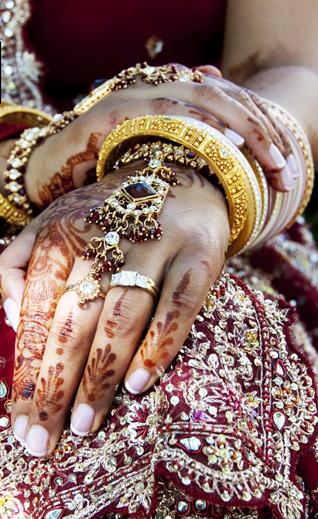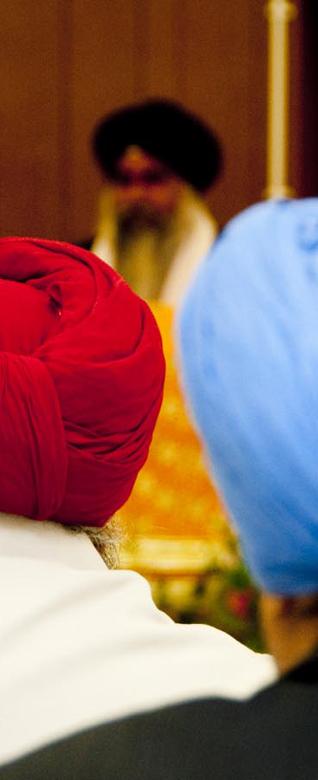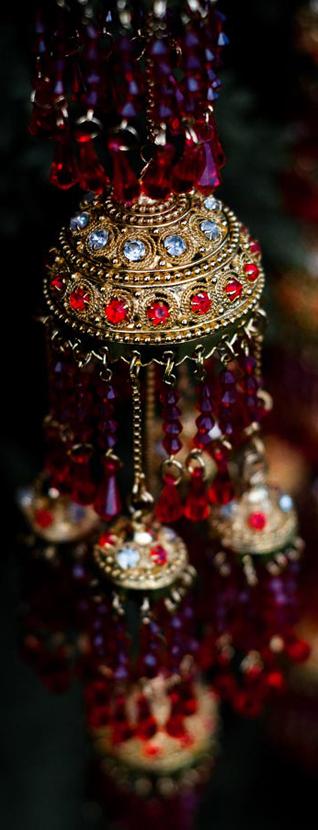People
The Anatomy of An Arranged Marriage
by DENISE IRVINE
Sukh Singh and his wife, Swarnjeet Kaur, sit together on a black leather couch in their Hamilton home. They smile, joke and touch as they tell their story of marriage and love.
"We clicked really quickly," says Sukh.
"After we met, I was so impressed by Sukh," says Swarnjeet, her face lighting up. "I liked his nature."
Sukh beams. He reckons that's a great response, jokes that it's even better than if he'd written cue cards for her.
Sukh and Swarnjeet are a good-looking couple, exuding the warmth and contentment of a husband and wife who've been together a long time, and understand each other's funny little ways. But the pair have known each other for only seven months.
They wed in Punjab on January 22, 2011, 19 days after their first meeting, and they had never been on a date together. They are Sikhs and theirs is an arranged marriage, the decision made jointly by their families as well as themselves.
Sukh is 28, Swarnjeet is 27, they're both smart, articulate, university educated and career oriented, and you'd think they'd be pretty good at choosing their own partner. But each has grown up knowing that one day they would find the right person through the age-old tradition of family consensus. "This is how it happens," Sukh says. "I never had any doubt about it."
Swarnjeet has friends who have made a "love marriage", but she feels arranged marriages are more successful. It is the basis of strong relationships, she says, and she had great faith in her family to help her find the right husband.
Swarnjeet is from Punjab, the Sikh heartland. Sukh came to New Zealand from Punjab as a pre-schooler with his mother, Nirmal Kaur, and older brother, Ripandeep Singh, after the death of their father. They joined the extended family in Gordonton and he's grown up in the Waikato.
Sukh is a laidback Kiwi lad, schooled at Hamilton Boys' High, then Waikato University. He's a sportsman, has a Kiwi accent and works for Telecom as a small enterprise business account manager.
He also speaks Punjabi and follows the Sikh religion; he's always known a Sikh bride would be his destiny, with compatible family values and background being important.
He has avoided relationships with Kiwi girls "because I knew there would be a conflict of interest; it wouldn't lead anywhere".
"I made sure it didn't happen."
Sukh says there is sometimes a poor perception of arranged marriages in New Zealand because it so different from how things are done here. As he says, they tend to be noticed only when a relationship fails and there are perhaps media reports of violence, "forced marriages" and parental pressure.
Most arranged marriages are not for public discussion. Sukh and Swarnjeet are opening up about theirs because they believe in the tradition and say they've seen it work happily in previous generations as well as their own. They value the huge family support they've had in finding each other.
Qualities in a wife
Sukh's journey to marriage started late last year. He'd achieved some personal goals, gained a degree, the family had built a beautiful new home in Hamilton: It was time to find a wife.
In an interview with Sukh in December last year, a week or two before he left for India, he was nervous and excited, mentioned that some of his workmates were "blown away" by what he was about to do.
His mother had gone ahead to India to get things started and classified advertisements were being placed on Sukh's behalf in Punjab newspapers. This outlined Sukh's background, and read a bit like a CV. He thought he might meet about four prospective brides.
Sukh said his mother wouldn't contact anyone until he got there. "All through this, she has said, 'It's your choice, there is no pressure.' "
Likewise, he said, a potential bride might meet him and turn him down.
"I don't want any pressure on either side that's the last thing I want. Everyone has the best intentions. My heart will have to be in it 100 per cent."
He outlined the qualities he was looking for in a wife: someone from a family with compatible values and background to his, a good education and understanding of English, a woman who would be brave enough to move to another country, who wanted to have children, and would also be comfortable living in the same household as Sukh's mother, his brother and sister-in-law, who all share a home.
Sukh said a sense of humour would be good, too. He laughed and said: "Someone who can appreciate my jokes. And get on with my friends and family. And someone attractive."
He found all this, and probably more.
A bit like speed dating
In India late last year, Swarnjeet was intent on finishing a Master's degree in Computer Science. Her younger sister had registered her on a matrimonial website for a joke, then noticed Sukh's profile and told Swarnjeet, "You should have a look at him."
One thing led to another through a mix of modern technology and ancient custom. Contact details were exchanged and Sukh's mother talked to Swarnjeet's aunt in the United States, who was acting in the place of Swarnjeet's late mother.
A meeting was arranged for January 3; the two families met, then Sukh and Swarnjeet sat in a room on their own with the door open and continued the discussions.
"It was a bit like speed dating," says Sukh. "We talked about all the important stuff. Things like how would Swarnjeet cope if she moved overseas, lived in a joint family home?"
The answers were bang on. "All the boxes were being ticked - she was already living in a joint family, she had a good understanding of English."
And, he adds, "She was attractive."
For her part, Swarnjeet quickly warmed to the young man. "Before I met Sukh, I was not serious [about finding a husband]. But I was so impressed by him. I liked his nature, he was so friendly, and I liked his smile."
Sukh had already met three women and another prospect was arranged for the next day. He says: "After meeting Swarnjeet, in my mind and heart I knew I didn't really need to [meet anyone else]." He told his mother he thought he'd found "the one".
Swarnjeet's family was invited to the home of Sukh's mother's family on January 5, and the pair talked more. Sukh told Swarnjeet how he was feeling. The relationship was almost agreed to, but both were obliged to consult further with their families and Swarnjeet's aunt flew in from the US in mid-January. The couple were engaged on January 18 and married four days later. There were hours of frantic work to get everything ready.
Arranged marriage - "Working happily"
Not that you'd think it was a rush, to look at the photographs of the lavish big day.
The religious ceremony took place at the Nanaksar Temple in Dharamkot, Swarnjeet's home village in Punjab, with the bride and groom in dazzling red and white outfits.
Everyone in the photos is smiling: parents, siblings, aunties, uncles, cousins, friends, up to 400 people assembling to wish the young couple well.
A few months on, the family is still smiling. In the lounge for this interview with Sukh and Swarnjeet is Sukh's mother, Nirmal, his sister-in-law Manjinder Kaur [married to brother Ripandeep], and Sukh's uncle, Harkrishen Singh, who is married to Nirmal's sister Satwinder.
They were all at the wedding in Punjab and are pleased with the outcome. Sukh says his mother is too shy to say much, but she is very happy with her two beautiful daughters-in-law and the home they have established together.
As we talk, the women get up to check on dinner and Manjinder and Swarnjeet bring snacks and drinks into the lounge. It raises the question of how it works with three women in the same kitchen.
"We share," they reply. Adds Swarnjeet, "I have a new mother and a new sister. I am very lucky."
Manjinder has been married to Ripandeep for just over two years. He is a lieutenant in the Royal New Zealand Navy; he is based in Devonport and commutes to Hamilton on his days off. Manjinder is a web developer from Hawke's Bay, now relocated to Hamilton. The contacts and arrangements for their marriage took place in Punjab, but they met in New Zealand and the wedding took place here.
Manjinder says there were perhaps a couple of meetings and some phone calls before marriage, and she has fitted happily into her new life.
Uncle Harkrishen Singh is clearly a respected senior member of the family. A retired Gordonton dairy farmer, he was awarded a Queen's Service Medal in this year's Queen's Birthday honours for his services to the Sikh-Kiwi community. A founding member of the Sikh Society, he was instrumental in the construction of New Zealand's first gurdwara at Te Rapa in 1977.
He is committed to the practice of arranged marriage; it remains widespread among Sikhs in New Zealand, and he sees it "working happily".
He says the key is that parents try very hard to find someone compatible for their children.
"They always have the best interests of their children at heart. Love starts after the wedding; it gets stronger."
He says if a couple fall out, the two families are there to support them. They have helped put the marriage together, they want it to work.
In a 'love marriage', he thinks family support is not always available because often the parents hardly know each other.
Sometimes arranged marriages too fail. Love does not grow, perhaps one party prefers a previous boyfriend or girlfriend, and sometimes the transition to New Zealand's local culture is too great. But even if there is a divorce, parents are involved in the arrangements.
Harkrishen and Sukh emphasise again the lack of pressure on young people to say yes.
Sukh acknowledges that sometimes parental pressure may have been the reason for a marriage failure in the past.
"The perception of people is that an arranged marriage is, Hey, you, you're getting married to that person. But everyone is involved and no one is obliged or forced into it."
During the lead-up to Sukh and Swarnjeet's marriage, both families were saying to their young people: "It's still not too late if you want to change your mind."
The settling period
After the marriage comes the settling-in period, where couples who until recently have been strangers must get to know each other.
Sukh, Swarnjeet and Harkrishen use the phrase, "love grows," as they discuss this transition.
Swarnjeet's take on it is that there are three stages in an arranged marriage: "You meet and marry, you gain an understanding of each other and share your feelings, then you become close and fall in love."
She and Sukh have done a lot of talking and Sukh says they can't believe how quickly they became comfortable with each other. "It felt like a love marriage we just clicked. I'm lucky."
Adds Swarnjeet: "I can share my feelings with my husband. He is like my best friend, as well as my life partner. He is my helping hand."
The helping hand is doing his best for his wife as she finds her feet in a new place. Sukh says it has been a leap of faith for Swarnjeet to move to New Zealand.
"She has stepped outside her comfort zone." He is very mindful that she has left many family and friends behind.
Swarnjeet stayed on in Punjab for a few months after the wedding to sit the final exam for her Master's on May 23. Two days after the exam, she travelled to New Zealand on a visitor's visa to join Sukh, who had returned home in February. Swarnjeet has applied for a work permit and permanent residency.
Sometimes she misses home, and says she never envisaged marrying a New Zealander and moving so far away. "It's all happened so quickly. But I like New Zealand a lot. This is now my country."
[Courtesy: Stuff. Edited for sikhchic.com]
July 27, 2011
Conversation about this article
1: H.S.Vachoa (U.S.A.), July 27, 2011, 12:42 PM.
But isn't it a fact that arranged marriage is a typical attribute and a pillar to support patriarchy? People should be encouraged to develop their own experiences in life, something our patriarchal culture denies.
2: Sangat Singh (Kuala Lumpur, Malaysia), July 27, 2011, 2:13 PM.
Arranged marriage does work ... if arranged properly and whetted by a committee of 6 elder sisters, as was in my case. I was too busy nurturing my career as a planter and living on plantations miles away from any decent town and therefore hardly had any prospects. A girl was duly chosen. Luckily, she came from a well known family where my own sister was happily married. Well, the day arrived and I had still to see her. The time for the laavaa(n) came and she was escorted in, heavily veiled with a yard long 'ghungutt' (veil) and was duly seated next to me before the Guru Granth Sahib. I still hadn't seen her face. Her lady-in-waiting kept adjusting her ghungutt if it moved even an inch away from the face. Soon after the laavaa(n), one of my naughtier nieces, while garlanding us, whispered: "Mama ji, have you seen Maami ji yet?" "No, not yet, but I can feel her now." Her left foot had become numb and was now lightly touching my right foot. The ceremony had started early with the full Asa di Vaar, followed by an hour long sikhia (sermon) by the resident granthi who once started, was too lazy to stop. But all went well and we were finally united. The ghungutt could now regress and she turned out to be the prettiest bride I could hope for ... and came with a B.Sc degree too, in the bargain. With usual tongue-in-cheek, I said: "Hi, I am your husband and my name is Sangat Singh. But, don't tell me yours, I already know yours." Today, looking back all those lovely years gone by, in a few more months we should be completing 50 years of our wedded bliss. We have four beautiful, highly accomplished daughters, all happily married, but not wholly arranged, as we allowed them the speaking part. With arranged marriages, you don't have to eat the promises you recklessly while plucking at the stars, etc. All said and done, man is incomplete without marriage and once married, he is finished ... in some cases, completely. Please take all of this with a pinch of salt. There is a Punjabi saying: 'Mathura ke payrrey jo khaayega woh pachhta-ay ga, jo nahi khaayega, woh bhi pachsta-ay ga.' - "Mathura's milk cakes: those who get to eat them are sorry; those who don't get to eat them are also sorry."
3: Baldev Singh (Bradford, United Kingdom), July 28, 2011, 3:40 PM.
Along side the scourge and blasphemy of the caste practices which have crept back somewhat into our community, alcohol and arranged marriages too have a nightmare! Not only do I hear from virtually ALL of my friends and family members, telling me their harrowing accounts of a wasted and traumatized life through having being 'introduced' to a person whom they have known nothing about, but also about how they had to share or give their 'pure' minds and bodies, though having nothing in common. The result is a 'loveless' and guilt ridden life with a lot 'what-ifs' and 'whys'. Marriage in Sikhism is not the marriage in Punjabi or Hindu practice. There is no pre-disclosure or sharing of relevant info between the future partners. What about the sexuality of the parties? Are they honest to each other about previous history, or subsequent adultery, or even thir thoughts about things like abortion and homosexuality? what about the 'slavery' attitude of the Punjabi 'mother-in-law'? What about the 'boy child' expectations? Dowry? The serving of alcohol during the wedding festivities? Their views on 'honour' killings? Arranged marriages do not work at any level and are only kept alive through the pretense that being together shows 'love' or parting company in a failed relationship will bring shame to the family name. Sikhi has nothing in common with the religion, culture or practices of either the Hindus or the Taliban. Our freedoms were won by saint-warriors to be free at every level of life and thought.
4: Harkeerat Singh (Bangkok, Thailand), July 28, 2011, 3:58 PM.
The process described in the article above is a distinct - and healthy - departure from the traditional arranged marriage, and certainly is an improvement. But I appreciate Baldev Singh's comments and agree that more can me done to improve the likelihood of success of such marriages. And one final point: success in marriage cannot be gauged by the degree of pain the couple has endured to stay together till the end of their lives, but by the support and friendship they give each other PAST the initial 'honeymoon' period, through thick and thin. And this will depend on honesty, trust, pragmatism ... and adherence to our lofty Sikh values of compassion, humanity and decency.
5: Sangat Singh (Kuala Lumpur, Malaysia), July 28, 2011, 8:12 PM.
Strictly for a laugh, to be taken twice daily with a spoonful of honey. Father and mother had permitted their only son to choose a girl, subject to the strict scrutiny by the mother. Come the day when the son announced such a girl was found, meeting the parameters set out by the mother. She was mighty proud of her son for such a sagacious choice. She set out to write a long letter praising his good sense, and the virtues of marriage. However, when the son received the letter, it had a line inserted at the end which had obviously been added by the father in his handwriting: "Your mother has gone to get postage stamps. You young fool, don't get married!"






